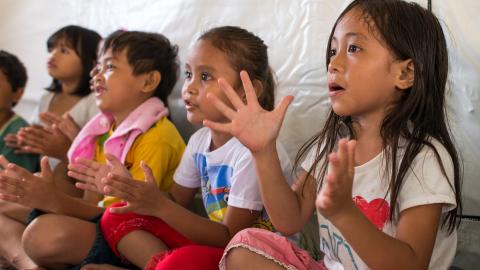
Humanitarian Research - Child Friendly Spaces
Child-friendly spaces (CFS) have become a widely used approach to protect and provide psychosocial support to children in emergencies. However, little evidence documents their outcomes and impacts. Recognising this, the Child Protection Working Group of the Global Protection Cluster and the Inter-Agency Standing Committee Reference Group on Mental Health and Psychosocial Support in Emergency Settings have identified research in this area as a high priority.
In response to a commitment to strengthen the evidence base for humanitarian practice and the prioritisation of CFS as a key area for research, World Vision and Columbia University, working with Save the Children, UNICEF and others, engaged in a three-year collaborative project to document the outcomes and impacts of CFS and develop capacity for rigorous evaluation.
the project completed six multi-agency impact-evaluations in five different emergency contexts
So far, the project completed six multi-agency impact evaluations in five different emergency contexts: Ethiopia (with Somali refugees), Uganda (with Congolese refugees), two settings in Iraq (with Syrian refugees), Jordan (with Syrian refugees) and DRC (with internally displaced communities). A final report and accompanying infographic summarize the findings of the first three years (2012-2014) of CFS research. For practitioners, an inter-agency companion document titled Tools and Guidance for Monitoring and Evaluating CFS was developed to provide practical guidance, in-depth lessons learned, and useful tools from the evaluations.
The ongoing Child-Friendly Spaces research has already provided more accurate evidence than most previous studies on the impact of Child-Friendly Spaces in emergencies. This has been achieved through adopting more standardised and rigorous measurement approaches, implementing baseline and endline assessments prior to and post-CFS, using comparison groups comprised of children not attending CFS, and encouraging the engagement of children during evaluations.
These impacts become more substantial if CFS programme quality is strengthened with an increased focus on relationship building between facilitators and children
Overall, the impact evaluations revealed a positive, though modest, impact of Child-Friendly Spaces on the lives of children, particularly with regard to their psychosocial well-being and protection. These impacts become more substantial if CFS programme quality is strengthened with an increased focus on relationship building between facilitators and children.
Evidence also showed that CFS interventions need to provide activities that fit local circumstances with respect to both the general context and the specific risks faced by children. This priority aligns with the objectives of creating a stronger engagement approach and innovative programmes which target older children and younger boys, who had lower rates of CFS attendance and impact than younger children and younger girls.
Other implications from the research include the need for more effective engagement with community protective systems, for innovation in approaches to the protection of children in urban contexts, and for long-term follow-up evaluations to document the enduring impact of CFS interventions on communities and children.
A second phase of the project began in 2014 with a grant from the ELHRA-managed Research for Health in Humanitarian Crises (R2HC) Programme to measure the longer-term impacts of CFS by conducting follow-up studies in Uganda and Jordan and a completely new multi-agency CFS impact evaluation in the Nepal earthquake response.
This multi-agency collaboration of implementing and supporting agencies, including UNICEF, Save the Children, Mercy Corps, AVSI and Plan International will ensure research findings and implications benefit the broader humanitarian community, notably through the Alliance for Child Protection in humanitarian action.
LEARN MORE:
- Check out our video resources from Child-Friendly Space Research in Nepal.
- Download the inter-agency evaluation of Child-Friendly Spaces.
- Review our tools and guidance for monitoring and evaluating Child-Friendly Spaces.
- View an infographic summary of the findings.